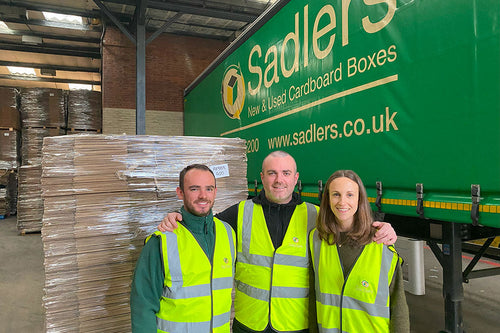How companies can make millions from a waste rethink

In 2013 Forbes reported that General Motors in the US generates $1 billion every year reusing materials such as metal and cardboard that would normally have been destined for recycling plants. The reporter Joann Muller gave the following example:
‘When an automaker's stamping press cuts the shape of a car door out of a flat sheet of steel, for example, there's a large hole reserved for the window. In most auto factories, the leftover steel cutouts are stacked up, then sold to a foundry, where they are melted with other bits of steel and converted into scrap metal. That's one way to recycle, but the melting and reprocessing of steel costs money and consumes a lot of energy.
General Motors sees those leftover steel cutouts, roughly four feet square, as a marketable commodity. It sells them directly to a local steel fabricator, Blue Star Steel, which uses them to stamp out small brackets for heating and air conditioning equipment for other industries, skipping the foundry altogether. Everyone benefits: GM maximizes the value of that leftover material; Blue Star Steel saves money buying scrap steel, and the environment is spared additional greenhouse gas emissions from a foundry.’
Does this process of diverting waste sound familiar to you? It’s a principle Sadlers have been shouting about for decades, and one used successfully throughout the UK to divert cardboard waste to reuse. But the practise is not as universal as you might imagine, given that the financial returns are so high. Why is this?
Recycling is good, isn’t it?
Recycling is now ingrained in our culture which is clearly a very positive thing. For example, it is thought that around 42% of household waste now collected by local councils in the UK is from our recycling bins, with a target of 50% by 2020. Our paper, cardboard, tins and plastic are taken away to be broken down and shaped into something new, and we barely have to think about it.
So it’s possible that companies can fall into this comfortable trap. They may make some money on arranging for their waste to be taken away and recycled but could be unaware that the returns are much higher if that waste is diverted to reuse. A scheme like the Sadlers cardboard box reuse scheme is designed to benefit the producer of the waste, the buyers of used boxes who get competitive prices, and the environment.
Isn’t reuse too much effort?
Put yourself in the shoes of a manufacturer for a moment. You might generate a lot of boxes, but sorting those boxes into sizes or types might seem a step too far. So to save the headache, you send the boxes off to a paper mill and feel satisfied that you are doing your bit to ensure the cardboard doesn’t go to waste. You don’t need to think about all those resources that go into breaking down those boxes and remaking them into… boxes. Recycling is good remember?
Reuse provides opportunities, not problems
Sadlers can save you that headache. We can help advise on a segregation process to ensure very little extra effort is involved. In fact, we have successfully implemented this process for many blue chip companies and our mission is to ensure that every large producer of cardboard waste in the UK benefits from this simple but effective waste management technique.
Are you ready to change the way you think about your waste? Do you want to develop profitable new revenue streams for your organisation? We’d love to talk to you – get in touch now.
Featured Articles

December 03, 2025
Options for Recycling Cardboard Boxes
How to recycle cardboard waste: a guide for business and the home The principles of recycling have b...

November 27, 2025
We are WINNERS of a National Recycling Award!
We're thrilled to announce a big win at the MRW National Recycling Awards 2025! Our pioneering cardb...

October 08, 2025
We’ve been shortlisted for the National Recycling Awards!
We’re excited to announce that we’ve been shortlisted in the circular economy category at the Nation...

July 17, 2025
Sadlers becomes Sustainability West Midlands Member
Back in February this year we made the decision to join the Sustainability West Midlands network whi...